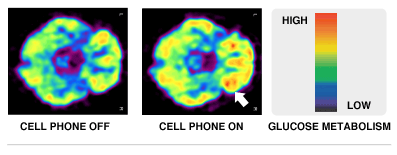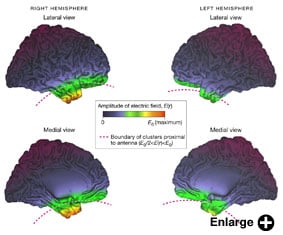AUGUST 27, 2013
Brain activity accelerates near
cell phone antenna
Volunteer's brain scans, normal (LEFT) and after 50 minutes with
an active cell phone on right ear, (RIGHT) show increased metabolic activity
near phone's antenna. (ARROW) A team led by Dr. Nora Volkow, head of the
National Institute on Drug Abuse, used advanced imaging technology to monitor
glucose consumed in the brain. Conclusion: weak cell phone emissions visibly
changed brain activity. More studies are needed to determine health
implications.
Washington, D.C.
– A team led by Dr. Nora D. Volkow, a pioneering brain imaging scientist who
heads the National Institute on Drug Abuse,has reported that cell phone
radiofrequency radiation alters brain activity in human subjects.
The study,
published by the prestigious Journal of the American Medical Association, is
the first investigation to document changes in brain glucose metabolism after
cell phone use. In a video accompanying the report, Volkow said the team
focused on how the brain consumes glucose because "It's a very sensitive
marker to indicate if there are changes in brain activity that may be driven by
a given stimulus, which in this case was the cell phone."
The conclusion,
according to Volkow: "Even though the radio frequencies that are emitted
from current cell phone technologies are very weak they are able to activate
the human brain to have an effect."
"This
research offers an important insight into potential effects of cell phone
radiation on the human brain," Renee Sharp, director of the Environmental
Working Group California office said. "It joins the growing list of
studies that have raised concerns about cell phone use and the brain."
Cell phone radiation can change brain activity
Video produced by the Journal of the American Medical Association features Dr. Nora Volkow, a pioneer in the field of brain imaging, explaining how she and a team from the National Institutes of Health and Brookhaven National Laboratory investigated the impact of cell phone radiofrequency emissions on the brain. "We really know relatively little about the potential effects that cell phone technologies may have on how the brain works," Volkow says. To find out, researchers fixed cell phones to 47 volunteers' heads, then made PET scans of metabolic shifts in their brains. See the experiment here.
Video produced by the Journal of the American Medical Association features Dr. Nora Volkow, a pioneer in the field of brain imaging, explaining how she and a team from the National Institutes of Health and Brookhaven National Laboratory investigated the impact of cell phone radiofrequency emissions on the brain. "We really know relatively little about the potential effects that cell phone technologies may have on how the brain works," Volkow says. To find out, researchers fixed cell phones to 47 volunteers' heads, then made PET scans of metabolic shifts in their brains. See the experiment here.
The study's
authors, who are affiliated with the National Institute on Drug Abuse, the
National Institute on Alcohol Abuse and Alcoholism and Brookhaven National
Laboratory, wrote that "these results provide evidence that the human
brain is sensitive to the effects of RF-EMF [radiofrequency-modulated
electromagnetic fields] from acute cell phone exposures." Volkow is
recognized for using imaging to explore changes in the brain linked to
addictive drugs, obesity, attention-deficit disorder and aging.
The research
team explored the impact of cell radiation on the brain by placing cell phones
on both ears of 47 healthy volunteers. The volunteers, seated in a darkened
room, were directed to keep their eyes closed and remain still for 50 minutes.
On the first day, both phones were turned off. On the second day, one was
turned on.
The volunteers' brains were subjected to
positron emission tomography, commonly known as PET scans, a medical imaging
technology, to measure glucose metabolism. "Compared with no exposure,
50-minute cell phone exposure was associated with increased brain glucose
metabolism in the region closest to the antenna," the study said.
The exact
mechanism underlying these metabolic effects and their human health
significance are still under investigation. Volkow and her colleagues theorized
that the changes they observed could be due to "cell membrane
permeability, calcium efflux, cell excitability, and/or neurotransmitter
release." Significantly, they rejected the hypothesis that the changes
were caused by tissue heating. This finding places them at odds with the cell
phone industry, which acknowledges no effects but heating when the brain
absorbs cell phone radiation.
While scientists continue investigating
the question, EWG recommends cell phone users limit their exposure to cell
phone radiation by taking easy steps such as getting a headset, using
speaker-phone mode, keeping the phone away from their body, and looking for
low-radiation phone models.
Click for more tipshttp://www.ewg.org/cellphoneradiation/8-Safety-Tips
Link to full study: http://jama.ama-assn.org/content/305/8/808.short Volkow ND, Tomasi D, Wang GJ, Vaska P,
Fowler JS, Telang F, Alexoff D, Logan J, Wong C. 2011.
Effects of cell phone
radiofrequency signal exposure on brain glucose metabolism. Journal of the
American Medical Association 305 (8), in press.
Article retrieved from http://www.ewg.org/cell-phone-radiation-affects-brain-function
Images retrieved from: http://www.ewg.org/cell-phone-radiation-affects-brain-function


0 comments:
Post a Comment